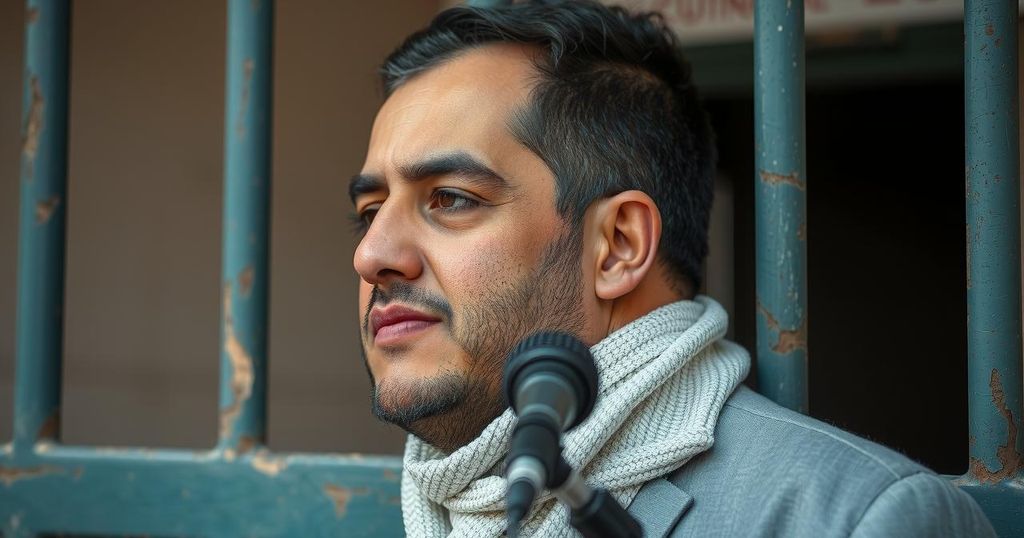Moroccan Activist Sentenced Amid Protests Over Earthquake Response

Moroccan activist Said Ait Mahdi was sentenced to three months in prison after leading protests against the government’s response to a September 2023 earthquake. His sentencing has been condemned by human rights advocates as politically motivated, amidst ongoing concerns regarding recovery efforts and civil liberties in the region.
On Monday, Said Ait Mahdi, a prominent Moroccan activist known for his leadership in protests against the government’s response to a devastating earthquake, was sentenced to three months in prison. His legal representative, Isaac Charia, reported that Ait Mahdi was also ordered to pay a fine exceeding $1,000. The charges against him included defamation, assault, and inciting an unauthorized demonstration. This sentencing occurs in the wake of a catastrophic 6.8-magnitude earthquake that struck the Al Haouz region in September 2023, resulting in nearly 3,000 fatalities and widespread destruction of housing and infrastructure.
Ait Mahdi’s case marks a significant moment, as he is the first activist from the affected region to receive such a sentence. Local communities have staged ongoing protests, accusing officials of mismanaging recovery efforts while many continue to live in temporary shelters. Charia noted that those facing similar charges typically receive harsher sentences, making Ait Mahdi’s three-month term a somewhat unexpected outcome.
Human rights advocates have denounced the charges as politically motivated and arbitrary. The Moroccan Association for Human Rights stated that the charges are a form of retaliation against Ait Mahdi for his vocal support of the earthquake survivors. A coalition of NGOs and left-wing political parties has declared that the judicial actions against Ait Mahdi serve to obscure serious violations that have surfaced amid the government’s inadequate earthquake response.
The aftermath of the earthquake has amplified existing inequalities in Morocco, particularly in areas populated by indigenous minorities. Government reports indicate that over 60,000 homes and at least 585 schools were damaged in the disaster. Moreover, the Moroccan government has pledged an ambitious $11.5 billion fund for recovery and rebuilding efforts over the next five years. Activists, including Ait Mahdi, have protested not only in smaller towns but also in larger cities like Rabat, emphasizing the inadequacies in the pace of reconstruction efforts.
The Civil Coalition of the Mountain, composed of NGOs and organizations from the earthquake-affected regions, recently highlighted the slow recovery progress, conducting demonstrations to attract attention to the plight of victims. Ait Mahdi has been referred to as “the voice of the oppressed and earthquake victims” by his supporters, who rallied outside the court during his trial, displaying his portrait and demanding his release.
The sentencing of Said Ait Mahdi stems from his involvement in protests reacting to the Moroccan government’s inadequate response to the severe earthquake that struck the Al Haouz region. This disaster not only caused significant loss of life and property but also spotlighted the existing socio-economic disparities in Morocco. Local activists and groups have critically assessed the government’s recovery efforts, advocating for accountability and prompt action to assist affected communities. Ait Mahdi’s activism brought attention to these issues, leading to his controversial arrest and sentencing, which many view as a suppression of dissenting voices in Morocco’s political landscape.
The imprisonment of Said Ait Mahdi is viewed as an alarming indicator of the Moroccan government’s retaliatory measures against activists advocating for transparency and better responses to social crises. Amid the ongoing recovery process from a devastating earthquake, Ait Mahdi’s case highlights the struggle for civil liberties and human rights in the country. The responses from civil society and human rights organizations underscore a growing concern regarding political motivations in judicial actions against dissenting voices in Morocco.
Original Source: www.thecanadianpressnews.ca







